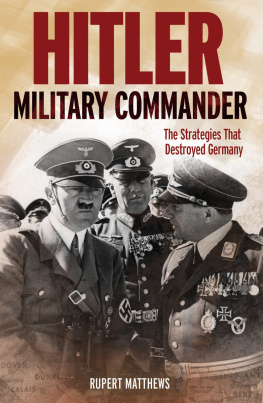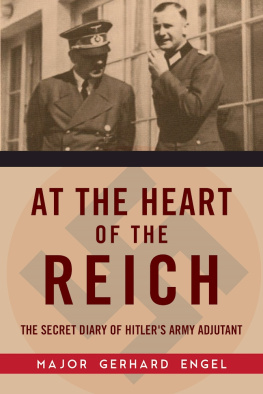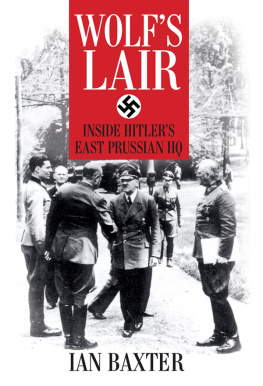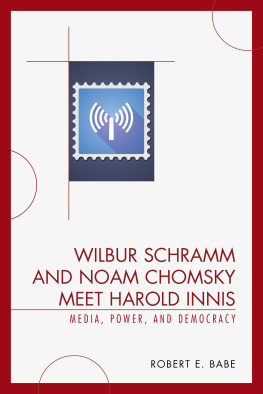

Published in 1999 by
Academy Chicago Publishers
363 West Erie Street
Chicago, Illinois 60610
1981 DonaldS. Detwiler
All rights reserved.
No part of this book may be reproduced in any way without the express written permission of the publisher.
Printed and bound in the U.S.A.
Portions of this book were first published in Hitlers Tichgesprche im Fhrerhauptquartier 19411942 by Dr. Henry Picker, edited by Prof. Percy Ernst Schramm, et al., copyright 1963 (2nd ed., 1965) by Seewald Verlag, Dr. Heinrich Seewald Stuttgart-Degerloch, and in Kriegstagebuch des Oberkommandos der Wehrmacht (Wehrmachtfiihrungsstab) 1940-1945, introduced and edited by Percy Ernst Schramm, copyright 1961 by Bernard & Graefe Verlag fr Wehrwesen.
Library of Congress Cataloging-in-Publication Data
Schramm, Percy Ernst, 1894-1970.
Hitler : the man and the military leader / Percy Ernst Schramm ; translated, edited, and with an introduction by Donald S. Detwiler.
p. cm.
Originally published: Chicago : Quadrangle Books, 1971.
Includes bibliographical references and index.
ISBN 0-89733-480-9
I. Hitler, Adolf, 1889-1945Military leadership. 2. Germany-Politics and government1933-1945. 3. World War, 1939-1945Germany. 4. Heads of stateGermanyBiography. 5. Strategy. I. Detwiler, Donald S. II. Title.
DD247.H5 S34 1999
943.086092dc21
99-051853
To the memory of the late Martin Ghring
Editors Acknowledgment
The publication in English of these two studies and the appendices was undertaken upon my initiative with the encouragement of the author. He gave me a free hand in translating and editing, but also gave freely of his time and energy when I consulted him with regard to different shades of meaning, minor revisions reflecting recent scholarship, and the like. Professor Schramm unexpectedly died on November 12, a few days after the manuscript had gone to press.
Very few changes or deletions were necessary to avoid undue overlapping of the two essays, even though they have not previously been published in a single volume. I did, however, omit a number of footnotes, particularly those which cited specialized foreign-language publications useful only to those who, in any case, would probably wish to refer to the meticulously documented volumes containing Schramms original scholarly German vision. In addition to retaining virtually all his explanatory notes, I contributed a number of additional ones providing information that could be presupposed on the part of most German readers, but hardly those of the English-speaking world. The abbreviation ED . identifies footnotes I supplied as editor.
This book is dedicated to the late Dr. Martin Ghring, Professor of History at Giessen University and Director of the Institute of European History in Mainz. For many years he was a friend and colleague of the author. I am indebted to him for the counsel and support he afforded me while I held a research fellowship at his institute ten years ago.
D.S.D
Carbondale, Illinois
November 1970
Contents
Index

Introduction
by Donald S. Detwiler
The two essays that follow were written as introductions to critical editions of two of the most important documents of the history of the Third Reich: the record of Hitlers informal Table Conversations in 1941 and 1942, and the official War Diary of the High Command of the Wehrmacht (Operations Staff).
Professor Schramm was not in Germany to witness Hindenburgs betrayal of his supporters when he appointed none other than his defeated Nazi opponent to the chancellorship. At the beginning of 1933 Schramm had gone to Princeton University on a fellowship, returning to Gottingen later the same year. He continued his teaching and medieval studies undisturbed until the war, when, as a reserve officer, he was called to active service. Given staff assignments in which he invariably was charged with the additional duty of keeping the unit war diary, Schramm was ordered to Hitlers headquarters in 1943 to keep the official diary of the High Command of the Wehrmacht. Understandably the professional soldiers of the German General Staff wished to entrust this responsibility to a professional historian.
Until replaced by Schramm in 1943, Helmuth Greiner, originally from the Reich Archives, had kept the diary. But he was neither a party man nor a regular officer, so he was vulnerable. Using a petty conflict with a minor Nazi official as a pretext, the head of the Party Chancellery, Martin Bormann, was able to prevail upon Hitler to transfer Greiner into the field. The generals had every reason to be disturbed by this action, surmising that Bormann had moved against Greiner so as to free his position for a militant Nazi.
The generals had a vested interest in the scrupulous objectivity of the historical record. Few, if any, could foresee in any detail what was to come. But they had already experienced serious conflicts with Hitler, whom they did not venerate as the greatest warlord of all times. As hardheaded professionals, they knew the record would bear them out if it were kept by a professional rather than a party hack. So when Greiner, a reputable military historian tailored to their tastes, was forced out, they were desperate to find the right sort of replacement quickly. Fortunately, a colonel on the Operations Staff remembered Schramm, at whose home he had been a guest while on garrison duty in Gottingen before the war. With an alacrity unusual even in German military practice, the assignment was made, effective January 1, 1943.
Things went smoothly enough for Schramm until 1944, when his sister-in-law -was executed for opposition to the Nazi regime. At about the same time, formal allegations of his own unreliability were transmitted to the Fhrer Headquarters from Gottingen by Himm-lers security service. Fortunately Schramms superior officer, General Alfred Jodl, disregarded these charges, so that he was allowed to retain his position to the very end. This meant that he was able, in defiance of Hitlers destruction order, to save copies or drafts of the greater part of the official diary covering the years 1943-1945. His predecessor, Greiner, meanwhile had secretly hidden copies of his drafts covering the first years of the war. Thus it was possible for Schramm, in association with Professors Hans-Adolf Jacobsen (Bonn), Andreas Hillgruber (Freiburg), and Walther Hubatsch (Bonn), three of his former students, to reconstruct and publish this extraordinary document as a whole. Comprising well over six thousand printed pages, the War Diary of the High Command is an absolutely unique historical record. No such compilation from the highest echelon is available on the history of the war as waged by the United States, the United Kingdom, or, for that matter, any other major power.
The first of the two essays in this volume, The Anatomy of a Dictator, is based primarily on the record of Hitlers own self-revealing statements made during and after meals at his headquarters on the Russian Front from July 1941 through July 1942. This information is frequently supplemented by insights Schramm gained while in the Fhrer Headquarters from the beginning of 1943 until the end of the war, as well as by what he was able to learn during postwar internment from persons who had been very close to Hitler. Schramm himself never conversed with Hitler and on only a few occasions was he in a position to observe him for an extended time. He was, however, in daily contact with officers directly under Hitlers influence, and immediately after the war he was able to confer at length with two of Hitlers personal physicians as well as his dentist.
Next page














